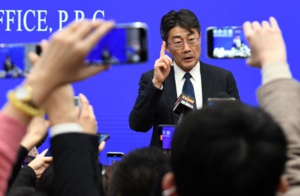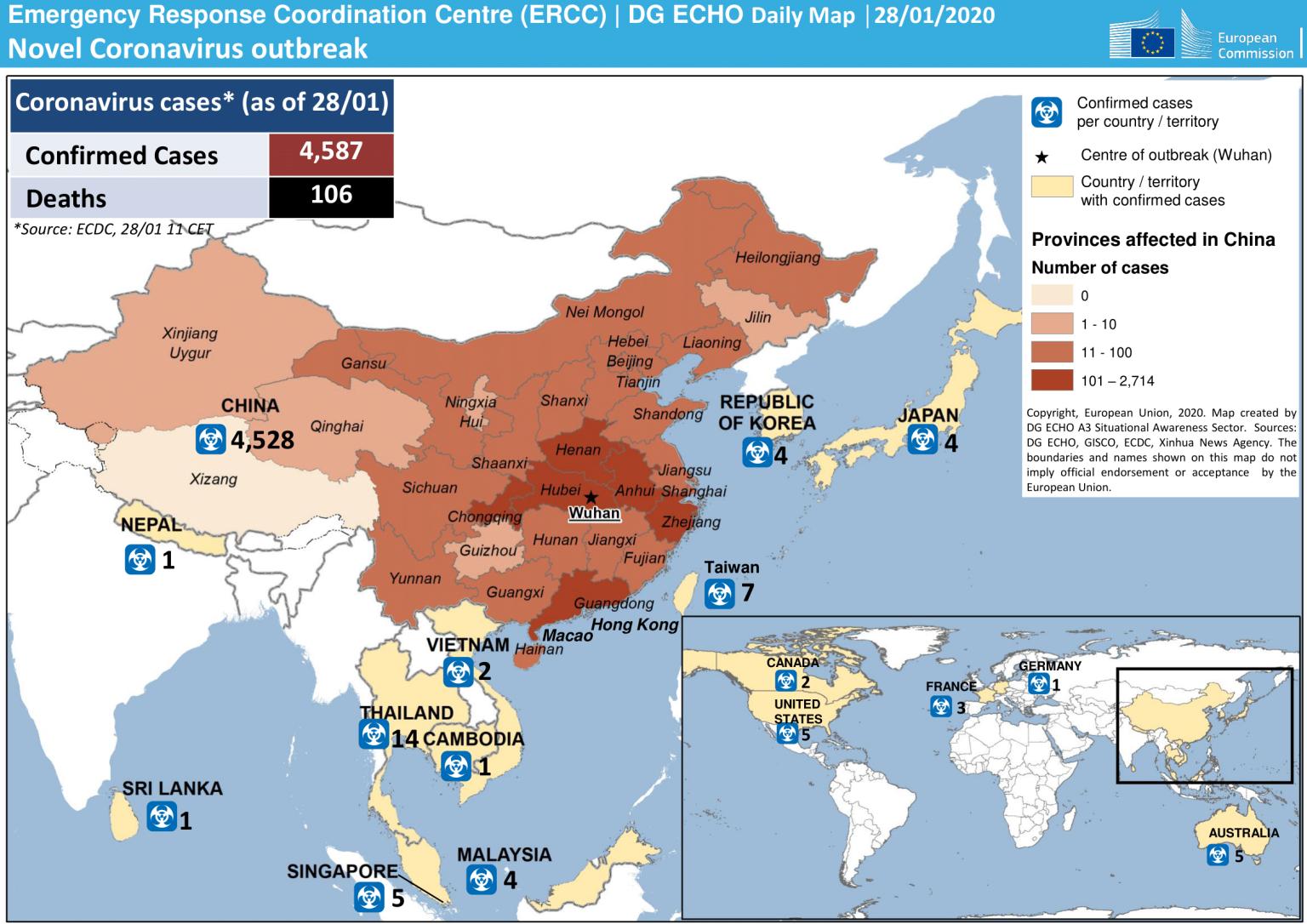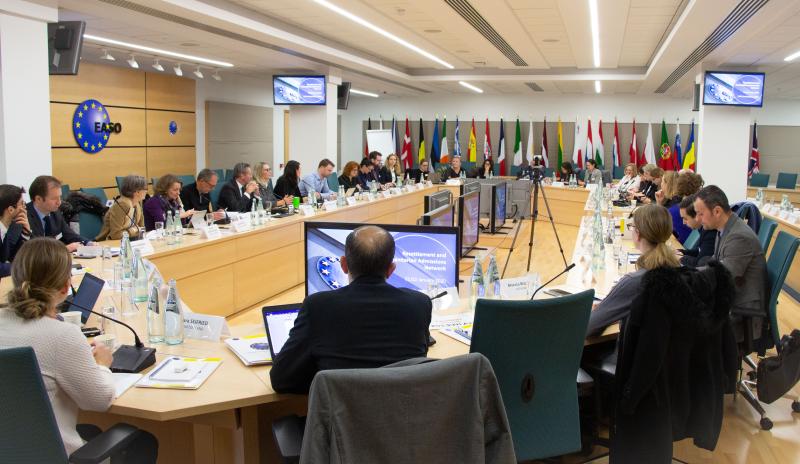As the outbreak of the novel COVID-19 (Coronavirus) intensifies, the EU Civil Protection Mechanism has been activated following a request for assistance from France to provide consular support to EU citizens in Wuhan, China.
Background.
The EU Civil Protection Mechanism strengthens cooperation between Member States/Participating States in the field of civil protection, with a view to improving prevention, preparedness and response to disasters. Through the Mechanism, the European Commission plays a key role in coordinating the response to disasters in Europe and beyond.
When the scale of an emergency overwhelms the response capabilities of a country, it can request assistance via the Mechanism. Once activated, the Mechanism coordinates assistance made available by its Member States/Participating States through spontaneous offers. In addition, the EU has created the European Civil Protection Pool to have a critical number of readily available civil protection capacities allowing for a stronger and coherent collective response.
To date, all EU Member States participate in the Mechanism, as well as Iceland, Norway, Serbia, North Macedonia, Montenegro, and Turkey. Since its inception in 2001, the EU Civil Protection Mechanism has responded to more than 300 requests for assistance inside and outside the EU.
The EU Civil Protection Mechanism strengthens cooperation between Member States/Participating States in the field of civil protection, with a view to improving prevention, preparedness and response to disasters. Through the Mechanism, the European Commission plays a key role in coordinating the response to disasters in Europe and beyond.
When the scale of an emergency overwhelms the response capabilities of a country, it can request assistance via the Mechanism. Once activated, the Mechanism coordinates assistance made available by its Member States/Participating States through spontaneous offers. In addition, the EU has created the European Civil Protection Pool to have a critical number of readily available civil protection capacities allowing for a stronger and coherent collective response.
To date, all EU Member States participate in the Mechanism, as well as Iceland, Norway, Serbia, North Macedonia, Montenegro, and Turkey. Since its inception in 2001, the EU Civil Protection Mechanism has responded to more than 300 requests for assistance inside and outside the EU.

Director of the Chinese Center for Disease Control and Prevention Gao Fu speaks during a State Council Information Office press conference in Beijing, 26 January 2020. Source: Noel Celis Getty Images
EU Civil Protection Mechanism activated for the repatriation of EU citizens.
The EU will co-finance the transport costs of the aircraft. The first aircraft is scheduled to depart from France tomorrow morning, while the second one will leave later in the week. EU citizens present in the region and who wish to be repatriated can still request it, no matter their nationality.
Initial numbers indicate that around 250 French citizens will be transported in the first aircraft and over 100 EU citizens from other countries will join the second aircraft. This is a first request for assistance and others may follow in the coming days.
At this stage, only healthy or asymptomatic citizens will be authorised to travel. The EU Emergency Response Centre is in constant contact with Member States' governments in order to coordinate the arrivals and subsequent possible quarantine periods.
The European Commission is in regular contact with Member States, the European Centre for Disease Prevention and Control and the World Health Organisation on all aspects of the COVID-19 (Coronavirus) outbreak.
- For further scientific information, kindly check: "The Coronavirus Questions that Scientists are Racing to Answer", Scientific American, Helen Branswell, STAT, 28 January 2020.
Updated on 12.02.2020
The EU will co-finance the transport costs of the aircraft. The first aircraft is scheduled to depart from France tomorrow morning, while the second one will leave later in the week. EU citizens present in the region and who wish to be repatriated can still request it, no matter their nationality.
Initial numbers indicate that around 250 French citizens will be transported in the first aircraft and over 100 EU citizens from other countries will join the second aircraft. This is a first request for assistance and others may follow in the coming days.
At this stage, only healthy or asymptomatic citizens will be authorised to travel. The EU Emergency Response Centre is in constant contact with Member States' governments in order to coordinate the arrivals and subsequent possible quarantine periods.
The European Commission is in regular contact with Member States, the European Centre for Disease Prevention and Control and the World Health Organisation on all aspects of the COVID-19 (Coronavirus) outbreak.
- For further scientific information, kindly check: "The Coronavirus Questions that Scientists are Racing to Answer", Scientific American, Helen Branswell, STAT, 28 January 2020.
Updated on 12.02.2020
Posted by Ch. Óscar de Andrés, on Wednesday, January 29th 2020 at 14:05
|
Comments (0)
Last week the European Asylum Support Office (EASO), in cooperation with the European Commission, hosted the first meeting of its Resettlement and Humanitarian Admission Network in its headquarters in Malta. The network aims at supporting EU+ countries in their resettlement work and in their shared priorities in this area.
External dimension of the Common European Asylum System (CEAS).
In compliance with its mandate, EASO’s external action supports the external dimension of the CEAS and contributes to the external relations policy framework set at EU level - kindly see section 4 of the EASO External Cooperation Strategy. To this end, EASO aims at maintaining and reinforcing its engagement and cooperation with key priority third countries, namely:
- The Western Balkan countries
- Turkey and
- Middle East and North African (MENA) countries
Activities in these areas are implemented by EASO’s External Dimension Sector, which is made up of two main thematic areas:
1. Resettlement: support EU+ countries resettlement schemes, and
2. Third country support: the delivery of capacity building activities in Third Countries (TCs) in line with EASO’s geographic priorities.
In this field, EASO works both through its own annual funding and through the implementation of projects financed by external sources, for instance the Instrument for Pre-accession Assistance (IPA).
In compliance with its mandate, EASO’s external action supports the external dimension of the CEAS and contributes to the external relations policy framework set at EU level - kindly see section 4 of the EASO External Cooperation Strategy. To this end, EASO aims at maintaining and reinforcing its engagement and cooperation with key priority third countries, namely:
- The Western Balkan countries
- Turkey and
- Middle East and North African (MENA) countries
Activities in these areas are implemented by EASO’s External Dimension Sector, which is made up of two main thematic areas:
1. Resettlement: support EU+ countries resettlement schemes, and
2. Third country support: the delivery of capacity building activities in Third Countries (TCs) in line with EASO’s geographic priorities.
In this field, EASO works both through its own annual funding and through the implementation of projects financed by external sources, for instance the Instrument for Pre-accession Assistance (IPA).
1. Support to Member States' resettlement efforts.
EASO supports the implementation of EU+ countries’ resettlement efforts in the framework of European resettlement schemes, in cooperation with the European Commission, the United Nations High Commissioner for Refugees (UNHCR) and other relevant actors.
In Turkey, EASO works closely with the EU Delegation (EUD) and EU Member States (MS) to monitor resettlement operations from Turkey to the EU, support and advise Member States’ resettlement efforts in the Turkish context.
EASO launched a Pilot Project in April 2019 for a Resettlement Support Facility (RSF) in Istanbul, Turkey. For a period of 18 months, working with the project partner International Catholic Migration Commission (ICMC), EASO will be providing a one-stop-shop facility where selection and cultural orientation missions are organised as part of the MS resettlement process. The pilot project facilitates all the logistical aspects of the missions, and is expected to create added value in terms of enhancing operational coordination of MS resettlement operations from one dedicated facility, stimulating cooperation between MSs, supporting them in fulfilling their pledges, testing new practices for increased effectiveness of the process, increasing cost efficiency and testing a replicable model of EU cooperation in the field of resettlement.
2. Exchange of information and knowledge building on resettlement and complementary pathways.
EASO also provides a platform for exchange and discussion among Member States on resettlement and complementary pathways. The Agency also takes part in the global and regional fora related to these topics.
EASO supported the development of the training module on resettlement as part of the EASO training curriculum and the creation of joint tools for future resettlement operations of Member States, in the framework of the European Union action "Facilitating Resettlement and Refugee Admission through New Knowledge" (EU-FRANK project). The project is led by the Swedish Migration Agency and involves relevant institutions in Belgium, the Netherlands, Italy, Switzerland, as well as UNHCR, the Migration Policy Institute (MPI), the International Organization for Migration (IOM) and ICMC. EASO is expected to take over the project results.
EASO’s activities in the field of complementary pathways started in 2017 through a pilot project on Private Sponsorship Programmes (PSP), which involved interested Member States and relevant stakeholders. The pilot project complemented the European Commission’s study on the feasibility and added value of private sponsorship schemes as a possible pathway to safe channels for admission to the EU, including resettlement.
EASO supports the implementation of EU+ countries’ resettlement efforts in the framework of European resettlement schemes, in cooperation with the European Commission, the United Nations High Commissioner for Refugees (UNHCR) and other relevant actors.
In Turkey, EASO works closely with the EU Delegation (EUD) and EU Member States (MS) to monitor resettlement operations from Turkey to the EU, support and advise Member States’ resettlement efforts in the Turkish context.
EASO launched a Pilot Project in April 2019 for a Resettlement Support Facility (RSF) in Istanbul, Turkey. For a period of 18 months, working with the project partner International Catholic Migration Commission (ICMC), EASO will be providing a one-stop-shop facility where selection and cultural orientation missions are organised as part of the MS resettlement process. The pilot project facilitates all the logistical aspects of the missions, and is expected to create added value in terms of enhancing operational coordination of MS resettlement operations from one dedicated facility, stimulating cooperation between MSs, supporting them in fulfilling their pledges, testing new practices for increased effectiveness of the process, increasing cost efficiency and testing a replicable model of EU cooperation in the field of resettlement.
2. Exchange of information and knowledge building on resettlement and complementary pathways.
EASO also provides a platform for exchange and discussion among Member States on resettlement and complementary pathways. The Agency also takes part in the global and regional fora related to these topics.
EASO supported the development of the training module on resettlement as part of the EASO training curriculum and the creation of joint tools for future resettlement operations of Member States, in the framework of the European Union action "Facilitating Resettlement and Refugee Admission through New Knowledge" (EU-FRANK project). The project is led by the Swedish Migration Agency and involves relevant institutions in Belgium, the Netherlands, Italy, Switzerland, as well as UNHCR, the Migration Policy Institute (MPI), the International Organization for Migration (IOM) and ICMC. EASO is expected to take over the project results.
EASO’s activities in the field of complementary pathways started in 2017 through a pilot project on Private Sponsorship Programmes (PSP), which involved interested Member States and relevant stakeholders. The pilot project complemented the European Commission’s study on the feasibility and added value of private sponsorship schemes as a possible pathway to safe channels for admission to the EU, including resettlement.
Category
Recent posts
Archives
#Team Management #Gestión de Equipo International Business Development #Gestión de Equipo Comercial
5 MISSION AREAS IN HORIZON EUROPE
Acceso universal al tratamiento del sida
ACNUR
actor Pepe Sancho
ADHESIÓN DE CROACIA A LA UE
advertising / teleshopping spots
Africa
Alianza Atlántica
Alianza del Pacífico
Alibaba
Alibaba Group Holding Ltd.
AlipayApp
Amnistía Internacional
Ana Pastor
AnálisisyGestiónInteligenteDeDatos
Angela Merkel
Banco Central Europeo (BCE)
Banco Mundial
Barack Obama
batalla del sector del taxi y VTC
Benjamin Franklin
Bill Gates
binomio chavismo / antichavismo
Blockchain opportunities in international public health care sector
Blockchain technologies in health care
Blog Posts
Boris Johnson
Brexit
BUILDING THE CITIES OF THE FUTURE
China
Comisión Europea
Coronavirus
Covid-19
COVID-19
Cybercrime
David Cameron
Editorial Universitas SA
EU Convention of Human Rights
European Commission
FMI
Henrique Capriles
Human Rights
ICAA
International Business Development
Jack Ma
Jean-Claude Juncker
Mariano Rajoy
Obama
ONU
OSCE
The Council of Europe
Thomas Hammarberg
UNED
UNHCR
Unión Europea
Vladímir Putin








